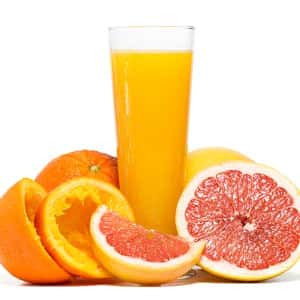
Choosing healthful foods and beverages has become increasingly controversial. For years, nutrition experts recommended a breakfast of cold cereal, toast with margarine and a glass of orange juice. We now know that the trans fats in margarine were worse than butter for your heart. Sugar-sweetened cereal is also problematic, as are all foods with added sugar. A new study even questions the benefit of orange juice.
The Problem with Fruit Juice:
More than 13,000 people participated in the REGARDS study (JAMA Network Open, May 17, 2019). (The name stands for Reasons for Geographic and Racial Differences in Stroke). During the six years of follow-up, people who drank the most fruit juice or sugar-sweetened beverages were significantly more likely to die than those who drank the least. Although people think of fruit juice as nutritious, people drinking juice were just as likely as those consuming soft drinks to die prematurely.
Fruit Juice Contains Fructose:
This is not the first study to note that sweet drinks are not good for your health. Most people realize that sugar-sweetened beverages are bad for the waistline. A review of research suggests that they are also bad for the heart.
What’s the Evidence?
Two Harvard nutrition scientists did a thorough review of the research (Journal of the American College of Cardiology, Oct. 6, 2015). They reported that increased sugar and high-fructose corn syrup in the US diet has contributed to obesity. In addition, people consuming such foods are more likely to have type 2 diabetes and cardiovascular disease. They based their conclusion on both observational studies and controlled trials. Apparently, when people consume sugary drinks, their bodies fail to compensate for the calories they have taken in. Consequently, these beverages can add extra pounds.
Fructose Is a Special Problem:
The way fructose is metabolized contributes to the problem. In addition to its effect on caloric intake, fructose stimulates the liver to make extra fat that gets packed around the abdominal organs. That adds to the cardiometabolic risk.
In an editorial in the same issue, Dr. Robert Vogel points out the complications that arise in trying to study the impact of food on health. His article is cleverly titled Pharma Versus Farmer.
Drinking Less Soda and Lowering Blood Pressure:
A previous study showed that people who cut back on soft drink consumption are able to lower their blood pressure. The trial included more than 800 adults and lasted a year and a half (Circulation, June 8, 2010). When it began, average soda consumption was just about one serving a day. The volunteers in the study were offered advice on healthy lifestyles, and those who reduced their sweet beverage consumption also lowered their blood pressure. Drinking one less soda pop or glass of juice drink daily corresponded to a drop of almost two points in systolic blood pressure, the upper number in the reading, and of about a point in diastolic blood pressure. The investigators controlled for caffeine consumption and weight loss and concluded that reduced sugar consumption had an independent blood pressure benefit.
Fruit Juice, Soda and Gout:
Other research showed that women who frequently consume sugar-sweetened beverages are more prone to gout, an exceedingly painful inflammation of the joints (JAMA, Nov. 24, 2010). The Nurses Health Study provided data from almost 80,000 women for more than 20 years. Dietary analysis shows that women who have two or more servings of sweetened soft drinks or fruit juice daily have double the risk of developing gout. This inflammatory condition leads to painful joints caused by uric acid crystals precipitating in soft tissue. Fructose raises uric acid levels, especially in people who have a history of gout. Because high fructose corn syrup is inexpensive, it is widely used to sweeten soft drinks and fruit juice.
The research demonstrates that even fruit juice that does not contain added sugar may have enough fructose to disrupt metabolism. There is no doubt that the healthiest beverage is plain water, although unsweetened coffee or tea would probably also get a pass on this criterion.
Citations
- Collin LJ et al, "Association of sugary beverage consumption with mortality risk in US adults: A secondary analysis of data from the REGARDS study." JAMA Network Open, May 17, 2019. doi:10.1001/jamanetworkopen.2019.3121
- Malik VS & Hu FB, "Fructose and cardiometabolic health." Journal of the American College of Cardiology, Oct. 14, 2015. DOI: 10.1016/j.jacc.2015.08.025
- Chen L et al, " Reducing consumption of sugar-sweetened beverages is associated with reduced blood pressure: a prospective study among United States adults." Circulation, June 8, 2010. DOI: 10.1161/CIRCULATIONAHA.109.911164
- Choi HK et al, "Fructose-rich beverages and risk of gout in women." JAMA, Nov. 24, 2010. doi:10.1001/jama.2010.1638

